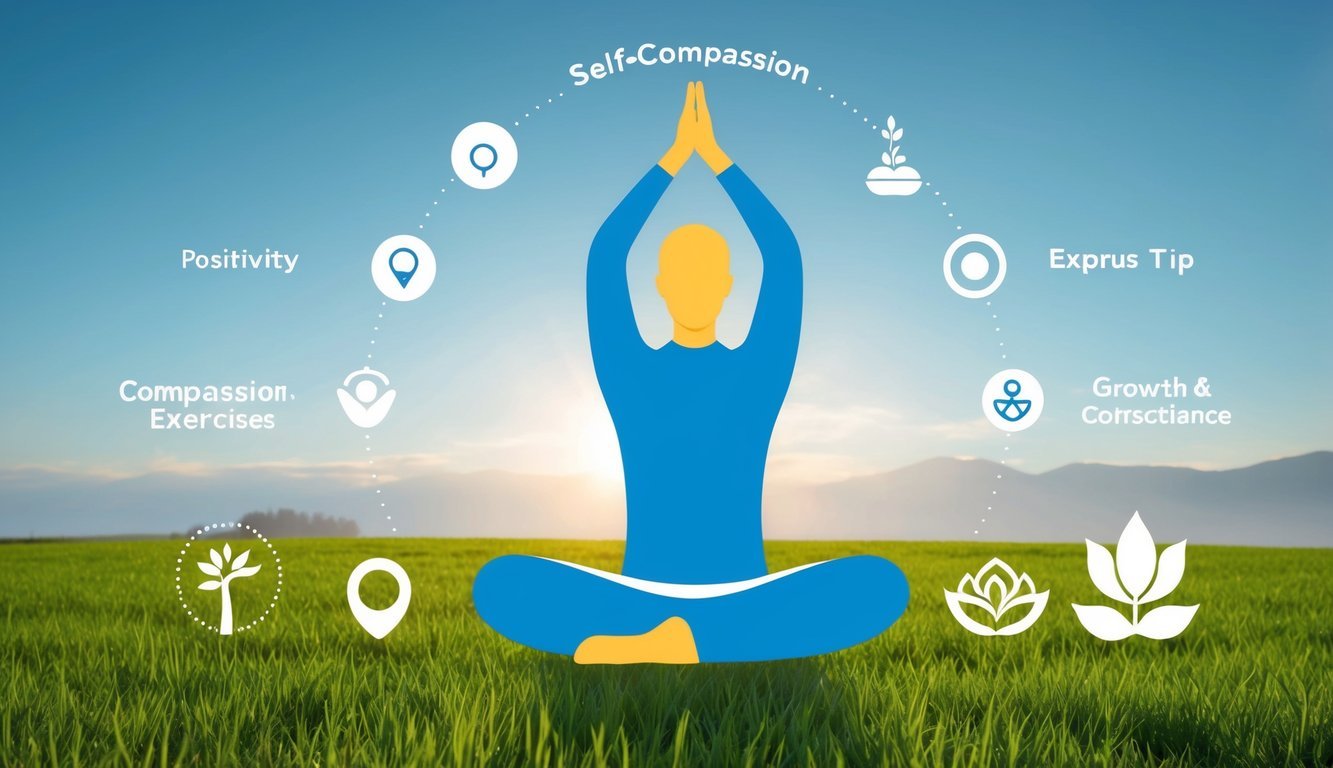PsychNewsDaily Publishers
100 Summit Drive
Burlington, MA, 01803
Telephone: (320) 349-2484
PsychNewsDaily Publishers
100 Summit Drive
Burlington, MA, 01803
Telephone: (320) 349-2484
Self-compassion fosters mental health by encouraging kindness towards oneself, reducing negative self-talk, and promoting resilience through mindfulness and emotional regulation techniques.

Self-compassion is an important practice for improving mental health and maintaining a positive outlook on life. When individuals treat themselves with kindness, especially during tough times, they build resilience and foster self-love. Engaging in self-compassion exercises can help individuals develop a more positive view of themselves and their experiences.
Practicing self-care through self-compassion allows people to address their feelings without judgment. This approach helps reduce negative self-talk and encourages a nurturing attitude towards oneself. Engaging in self-compassion exercises can help individuals develop a more positive view of themselves and their experiences.

Self-compassion is about treating oneself with kindness and understanding during difficult times. It includes recognizing one’s struggles and relating to them without harsh judgment. This section explores its definition, the importance of mindfulness, and insights from Dr. Kristin Neff.
Self-compassion is the ability to be gentle with oneself when facing challenges. It involves three key components:
These elements work together to promote emotional regulation and a healthier outlook on life. By practicing self-compassion, individuals can decrease self-criticism and enhance their self-worth.
Mindfulness is central to self-compassion. It means being present in the moment and observing thoughts and feelings without judgment. This practice helps individuals to:
By incorporating mindfulness into self-compassion exercises, people can enhance their emotional well-being. This approach supports resilience and positivity.
Dr. Kristin Neff is a pioneer in the study of self-compassion. She developed a framework to help individuals practice self-kindness effectively. Her work emphasizes:
Her insights have shaped the way many approach self-care and emotional resilience. By following her guidance, individuals can work toward a more compassionate mindset.

Self-compassion is an important part of emotional well-being. There are several effective exercises to help individuals cultivate a kinder relationship with themselves. These exercises include practicing a self-compassion break, engaging in loving-kindness meditation, and exploring self-compassion through writing.
A self-compassion break is a simple yet powerful exercise. It can be done anywhere, anytime. To begin, a person should pause and take a few deep breaths. Then, they can acknowledge their feelings without judgment.
They might say to themselves:
This practice helps normalize difficult feelings and fosters a sense of connection with oneself. By recognizing that everyone struggles, individuals can create a more compassionate inner dialogue.
Loving-kindness meditation, or “Metta,” encourages feelings of love and kindness towards oneself and others. This practice involves sitting comfortably and silently repeating phrases that promote goodwill.
Common phrases include:
Participants are encouraged to start with themselves before extending these wishes to loved ones and even to people they find difficult. This meditation can enhance empathy and reduce negative feelings, offering a more positive outlook on life.
Writing can be a powerful tool for self-compassion. One effective method is to write a self-compassionate letter. In this letter, individuals can address themselves as they would a dear friend.
They should reflect on challenges they face and offer words of support. This could involve noting positive qualities or focusing on personal strengths.
Another approach is to keep a journal to track thoughts and feelings. Writing can help clarify emotions and reinforce a sense of peace. By putting pen to paper, one can gain insights and develop a more compassionate perspective.

Fostering a positive outlook through self-compassion can greatly enhance well-being. This involves recognizing worth and practicing kindness towards oneself. Key techniques like gratitude, affirmations, and addressing the inner critic can support this journey.
Practicing gratitude is a powerful way to promote happiness. Keeping a gratitude journal is an effective method. Each day, she can write down three things she appreciates about her life. This simple act helps shift focus from negativity to positivity.
Additionally, expressing gratitude can be meaningful. She might thank a friend or family member for their support. This connection not only boosts her mood but reinforces relationships, creating a cycle of kindness. Over time, these small practices build a more hopeful mindset.
Daily affirmations can change how one views themselves. By choosing positive self-talk, he can counter negative thoughts. Simple phrases like “I am enough” or “I deserve happiness” can have a big impact when repeated regularly.
Incorporating affirmations into daily routines can create lasting habits. She could say these phrases in the morning or write them down in a visible space. This practice reinforces self-love and boosts confidence. Gradually, it helps build a belief in her own abilities and worth.
Many struggle with the inner critic, that negative voice that doubts and judges. Learning to challenge it is essential for self-compassion. Instead of accepting harsh judgments, she can replace them with understanding thoughts.
For instance, when the critic says, “You aren’t good enough,” she might respond with, “I am doing my best.” This approach helps to silence negative chatter. Techniques like mindfulness can also help in recognizing these thoughts without judgment, allowing for more self-kindness and a positive outlook.

Self-acceptance plays a crucial role in developing emotional resilience. When individuals practice acceptance and empathy towards themselves, they can strengthen their ability to handle life’s challenges. This fosters a positive mindset built on self-kindness and unconditional love.
Forgiveness is essential for emotional healing. It enables individuals to release feelings of resentment and anger that can weigh them down. By practicing self-forgiveness, they can let go of past mistakes and recognize their humanity.
To forgive oneself, they should first acknowledge their feelings. It’s important to understand that everyone makes mistakes. Taking this step requires patience and empathy, especially during difficult moments. Accepting imperfections can lead to inner peace.
Negative self-judgments can be damaging. They create barriers that prevent individuals from embracing their true selves. By changing critical self-talk, they can develop a healthier mindset.
One effective approach is to identify and challenge negative thoughts. Writing them down can help in recognizing patterns. Next, individuals should replace these thoughts with affirmations that reinforce self-worth. Simple phrases like “I am enough” can make a difference.
It’s also beneficial to practice mindfulness. This helps create distance from harsh self-judgments, allowing individuals to observe their thoughts non-judgmentally. Ultimately, letting go of negativity empowers them to embrace life with courage.
Building self-worth is fundamental for emotional resilience. When individuals value themselves, they can tackle challenges with confidence. Self-acceptance nurtures a sense of belonging and purpose.
To enhance self-worth, setting small, achievable goals is effective. Accomplishing these goals builds confidence and fosters a sense of accomplishment. Acknowledging personal strengths and celebrating successes, no matter how small, is crucial.
Additionally, surrounding oneself with supportive people can positively impact self-esteem. Engaging in activities that bring joy also reinforces a strong sense of identity. This commitment to self-kindness and positivity contributes to long-term emotional resilience.

Incorporating self-compassion into daily routines can greatly enhance personal well-being. By adopting simple practices such as journaling, performing acts of kindness, and cultivating mindfulness, individuals can build a stronger sense of self-love and resilience.
Keeping a self-compassion journal is a helpful way to explore feelings and thoughts. This practice can involve writing down daily experiences, along with feelings associated with them.
Journal prompts can guide reflections. For example:
Writing these thoughts down encourages acceptance and non-judgment. Over time, it can help shift perspectives and foster a more positive outlook.
Engaging in acts of kindness can uplift anyone’s spirit. Simple actions like taking a warm bath, enjoying a favorite hobby, or practicing loving-kindness meditation can nurture self-compassion.
Individuals can also spread kindness to others. This could be as simple as complimenting a friend or helping a neighbor. Research shows that performing acts of kindness enhances personal growth and well-being.
Such actions create a cycle of positivity, where giving kindness leads to feeling more compassionate toward oneself.
Mindfulness helps create a conscious awareness of thoughts and feelings. Practicing mindful breathing and body scan meditation can ground individuals in the present moment.
Integrating mindfulness into daily routines means being attentive during activities. Whether washing dishes or walking, paying attention to sensations creates a sense of peace.
By recognizing feelings without judgment, people learn to respond with kindness, not criticism. This practice fosters a more compassionate inner dialogue and reduces stress in everyday life.

Self-compassion can play a crucial role in fostering a positive outlook. It helps individuals treat themselves with kindness and understanding, especially during tough times. Here are some important questions and answers regarding self-compassion exercises and their benefits.
To bring self-compassion into daily life, a person can start by setting aside time for reflection. Daily journaling about personal experiences and feelings can be helpful. Brief moments of mindfulness, where one focuses on breathing, can also create space for self-kindness.
Using positive self-talk is an effective strategy. When faced with self-criticism, replacing negative thoughts with supportive messages is key. Practicing gratitude can also boost emotional well-being. Listing things they appreciate about themselves helps create a kinder inner narrative.
Self-compassion can reduce feelings of anxiety and depression. By treating themselves with kindness, individuals often feel less isolated in their struggles. This practice encourages resilience, helping individuals bounce back from difficulties and maintain a balanced perspective.
Psychologists suggest various exercises, such as writing a compassionate letter to oneself. Another helpful exercise is to visualize how they would comfort a friend in distress and apply the same kindness to themselves. Engaging in loving-kindness meditation can also promote self-acceptance.
Self-compassion phrases involve repeating affirming statements. For instance, saying “I am doing my best” or “It’s okay to feel this way” can help shift the inner dialogue. These phrases remind individuals to treat themselves with the same care they would offer a friend.
Practical steps include setting aside time for mindfulness practice each day. This can be as simple as focusing on the breath for a few minutes.
Combining mindfulness with self-compassion affirmations reinforces the practice. This allows individuals to cultivate a supportive mindset over time.